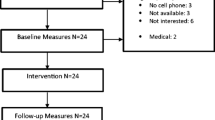Abstract
Purpose
Previous studies have underlined the benefits of exercise during cancer therapy. However, patients are insufficiently active during treatment. Telehealth is used to encourage people to be active, reducing difficulties and offsetting the lack of infrastructure often reported. We aimed to identify the effects of recommendations and telehealth on the level of physical activity, fatigue, and quality of life.
Methods
Sixty patients suffering from various cancers under treatment were randomized into two groups. Every Sunday, they had to complete online questionnaires: number of steps, MFI-20, and EORTC-QLQ-30. Group R (recommendations) was given encouragement to improve physical activity during 8 weeks, using a recommendation guide, and received a weekly SMS text message for exercise promotion. Group C, without recommendations, was the control group.
Results
Two-way ANOVAs for repeated measures did not reveal effect on the number of steps walked over time; however, the results indicated a beneficial effect for group R related to self-reported fatigue (F = 2.686, p = .01) and quality of life (F = 2.431, p = .02).
Conclusion
Surprisingly, the level of exercise in group R did not significantly increase, but self-reported fatigue and quality of life were improved. This study underlines that inexpensive sharing of time, human, and financial means, through a protocol of physical activity, improves patient health.



Similar content being viewed by others
References
Stout NL, Baima J, Swisher AK, Winters-Stone KM, Welsh J (2017) A systematic review of exercise systematic reviews in the cancer literature (2005-2017). PM R 9:S347–S384. https://doi.org/10.1016/j.pmrj.2017.07.074
INCA (2012) Activity Physique et Cancer. La lettre de l’Inca
Knobf MT, Musanti R, Dorward J (2007) Exercise and quality of life outcomes in patients with cancer. Semin Oncol Nurs 23:285–296. https://doi.org/10.1016/j.soncn.2007.08.007
Knols R, Aaronson NK, Uebelhart D (2005) Physical exercise in cancer patients during and after medical treatment: a systematic review of randomized and controlled clinical trials. J Clin Oncol 23:3830–3842
Mishra SI, Scherer RW, Geigle PM, et al (2012) Exercise interventions on health-related quality of life for cancer survivors. Cochrane Database Syst Rev
Peretti A, Amenta F, Tayebati SK et al (2017) Telerehabilitation: review of the state-of-the-art and areas of application. JMIR Rehabil Assist Technol 4:e7. https://doi.org/10.2196/rehab.7511
Kairy D, Lehoux P, Vincent C, Visintin M (2009) A systematic review of clinical outcomes, clinical process, healthcare utilization and costs associated with telerehabilitation. Disabil Rehabil 31:427–447. https://doi.org/10.1080/09638280802062553
Hailey D, Roine R, Ohinmaa A, Dennett L (2011) Evidence of benefit from telerehabilitation in routine care: a systematic review. J Telemed Telecare 17:281–287. https://doi.org/10.1258/jtt.2011.101208
INCA (2017) Bénéfices de l’activité physique pendant et après cancer, des connaissances scientifiques aux repères pratiques – Synthèse
Gentile S, Delarozière JC, Favre F et al (2003) Validation of the French ‘multidimensional fatigue inventory’ (MFI 20). Eur J Cancer Care (Engl) 12:58–64. https://doi.org/10.1046/j.1365-2354.2003.00295.x
Smets EM, Garssen B, Cull A, De Haes JCJM (1996) Application of the multidimensional fatigue inventory (MFI-20) in cancer patients receiving radiotherapy. Br J Cancer 73(2):241–245
Aaronson NK, Ahmedzai S, Bergman B, Bullinger M, Cull A, Duez NJ, Filiberti A, Flechtner H, Fleishman SB, Haes JCJM, Kaasa S, Klee M, Osoba D, Razavi D, Rofe PB, Schraub S, Sneeuw K, Sullivan M, Takeda F (1993) The European Organization for Research and Treatment of Cancer QLQ-C30: a quality-of-life instrument for use in international clinical trials in oncology. J Natl Cancer Inst 85:365–376
Desnoyers A, Riesco E, Fülöp T, Pavic M (2016) Physical activity and cancer: update and literature review. Rev Médecine Interne 37:399–405. https://doi.org/10.1016/j.revmed.2015.12.021
Simon A (2003) Cancer and fatigue. Med Pal 2:14–22
Bandura A (1986) Social foundations of thought and action: a social cognitive theory. Prentice-Hall, Englewood Cliffs
Haas B (2002) Fatigue, self-efficacy for physical activity, physical activity, and quality of life in women with breast cancer
Rondier M (2004) A. Bandura. Auto-efficacité. Le sentiment d’efficacité personnelle. Orientat Sc Prof 475–476
Hoffman AJ (2013) Enhancing self-efficacy for optimized patient outcomes through the theory of symptom self-management. Cancer Nurs 36:E16–E26. https://doi.org/10.1097/NCC.0b013e31824a730a
Hoffman AJ, von Eye A, Gift AG, Given BA, Given CW, Rothert M (2009) Testing a theoretical model of perceived self-efficacy for cancer-related fatigue self-management and optimal physical functional status. Nurs Res 58:32–41. https://doi.org/10.1097/NNR.0b013e3181903d7b
Colloca G, Colloca P (2016) The effects of social support on health-related quality of life of patients with metastatic prostate cancer. J Cancer Educ 31:244–252. https://doi.org/10.1007/s13187-015-0884-2
Costa-Requena G, Ballester Arnal R, Gil F (2015) The influence of coping response and health-related quality of life on perceived social support during cancer treatment. Palliat Support Care 13:683–689. https://doi.org/10.1017/S1478951514000418
Van Dijck S, Nelissen P, Verbelen H et al (2016) The effects of physical self-management on quality of life in breast cancer patients: a systematic review. Breast 28:20–28. https://doi.org/10.1016/j.breast.2016.04.010
Hoffman AJ, Brintnall RA, Brown JK, Eye AV, Jones LW, Alderink G, Ritz-Holland D, Enter M, Patzelt LH, VanOtteren GM (2013) Too sick not to exercise: using a 6-week, home-based exercise intervention for cancer-related fatigue self-management for postsurgical non-small cell lung cancer patients. Cancer Nurs 36:175–188. https://doi.org/10.1097/NCC.0b013e31826c7763
Funding
This research was supported by Laboratoire ROCHE (Ph.D Grant of C. Villaron), IPC (SIRIC–INCa–DGOS–Inserm 6038) and the Aix-Marseille University Foundation.
Author information
Authors and Affiliations
Corresponding author
Ethics declarations
Conflict of interest
The authors declare that they have no conflict of interest.
Ethical approval
All procedures performed in studies involving human participants were in accordance with the ethical standards of the institutional and/or national research committee and with the 1964 Helsinki declaration and its later amendments or comparable ethical standards.
Informed consent
Informed consent was obtained from all individual participants included in the study.
Rights and permissions
About this article
Cite this article
Villaron, C., Cury, F., Eisinger, F. et al. Telehealth applied to physical activity during cancer treatment: a feasibility, acceptability, and randomized pilot study. Support Care Cancer 26, 3413–3421 (2018). https://doi.org/10.1007/s00520-018-4191-4
Received:
Accepted:
Published:
Issue Date:
DOI: https://doi.org/10.1007/s00520-018-4191-4




